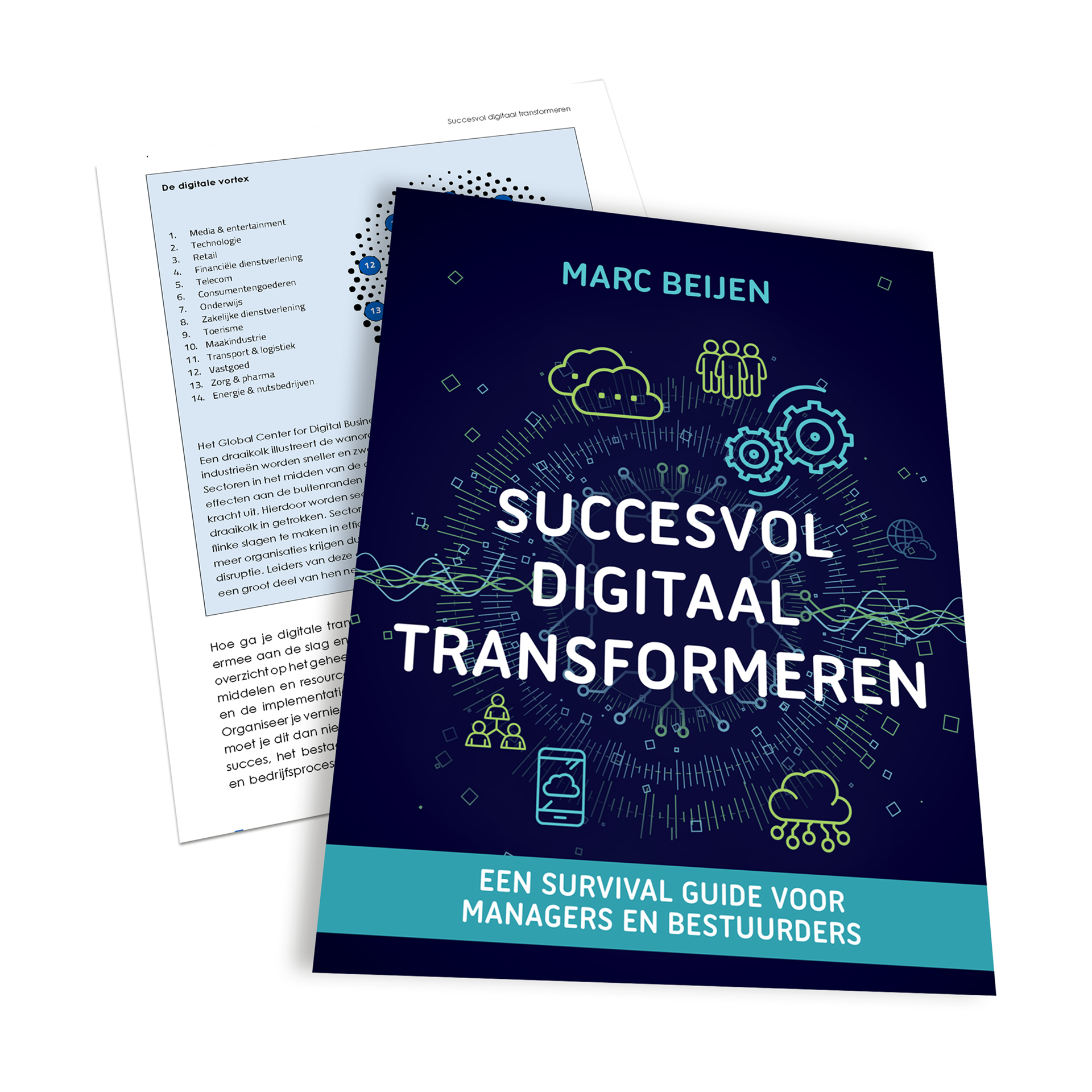1. There is no standard approach for how to tackle digital transformation successfully; a clear digital strategy is a must to start this up.
Leading successful digital transformation
27-11-2020
DigitalMarc Beijen explores what it takes to drive positive, effective digital change

Digital transformation is a very hot topic, but certainly not entirely new. I have been supporting clients in government and the private sector for more than 20 years in the successful use of information technology in combination with new business models. But, what is new is how critical digital transformation has become to organisational success today.
In recent times, enormous challenges have appeared across all sectors. Business models are shifting, new competitors are entering your markets, customers are setting new requirements and the rules of operations and commerce are fundamentally changing. Digital transformation gives organisations the opportunity to respond to these changes and turn them to their advantage.
In recent times, enormous challenges have appeared across all sectors. Business models are shifting, new competitors are entering your markets, customers are setting new requirements and the rules of operations and commerce are fundamentally changing. Digital transformation gives organisations the opportunity to respond to these changes and turn them to their advantage.
Key take-aways
2. Strong leadership is a precondition for successful digital transformation; leaders must have the necessary knowledge and skills and digital DNA.
3. Digital innovation is no longer a priority, it is a necessity. Organisations need to tackle this with high speed to play a leading role in their market.
Finding the right approach forward
There’s one burning question that still stands between thousands of organisations and successful digital transformation: how?One reason digital transformation has remained such a challenging topic for so long is that it can take a huge range of forms. It can involve creating a brilliant customer experience, digitising business processes, leveraging data, embracing new technology, adopting new business models and much more.
And even if you have successfully identified what you want to achieve with digital transformation, there is not one right way forward. It is a journey in which every organisation must find its own path.
To make matters worse, managers are under tremendous pressure to lead that journey, and be immediately successful. Today, digital transformation isn’t just a priority, it’s a necessity for everyone - a challenge in which managers must take the lead.
Three questions you should ask
It is not easy to determine exactly what it takes to lead a successful digital transformation. That's a challenge I addressed in my new book, Successful Digital Transformation: A Survival Guide for Managers and Leaders.
In the book, I highlight some of the questions that managers and leaders should ask to ensure that their digital transformation plans are as robust, valuable and future-ready as possible. Here are three of the most important:
- Has the leadership team invested in your digital change?
It is imperative that senior management is actively involved in the process, so they can communicate its importance and ensure high acceptance across the organisation. You can support this by spreading the vision, setting the stage for frontrunners, removing barriers and making change as easy as possible for them.
- Am I starting too big?
Digital transformation is a learning process. It pays to start small, learn lessons, and gradually increase the size and scope of your projects as you see success. By jumping in with a large project first, you risk significant financial losses – and can hinder future essential transformation projects by lowering the organisation’s confidence and belief in them.
- How open am I to change?
One of the biggest threats to digital transformation is to stay rigidly close to the original scope. All initiatives start with good intentions, but circumstances are constantly evolving - so your teams must be able to act and adjust autonomously.
Remember that above all, your main goal is to align your organisation with the modern demands of your industry. If the context changes, your plans will have to change too.
Successful transformation starts with leadership
More than ever, managers have to think and make choices about how digitisation can create value. Optimal use of IT can make the difference between decisive competitive advantage, survival and loss. You cannot leave this to experts in your organisation or outsource it to a supplier or consultant.Managers must understand the world of robotics, IoT, Big Data, blockchain, machine learning and artificial intelligence, so they can make informed decisions about how to apply and implement them. Put simply, they must become digital experts, as well as business experts.
With a sharp view of market developments, technological possibilities and an experienced business perspective, leaders can build up a clear picture of how to successfully organise and manage their digital transformation.
This starts with formulating a sharp digital strategy – but that’s just the beginning. You need to properly organise the entire change cycle in your organisation.
Focus on changes that create the most value. Organise value teams to implement this quickly, but also with the right quality. And ensure your organisation has the capacity and freedom to make short-cycle adjustments and learns from failures and successes.
Download the look-insideDownload the look-inside
BookDownload the look-insideDownload the look-inside
About the author
Marc Beijen is a founder and partner of the Novius Advisory Group, which has been part of Royal HaskoningDHV Digital since October 2020. He has authored numerous books in the field of strategy, business & IT planning and information management.
He’s also the founder of the "Business Transformation Framework", which is now used by many organisations as a de-facto standard for the translation of the business strategy into the tactical change calendar.
His latest book Successful Digital Transformation: A Survival Guide for Managers and Leaders is available for purchase now in Dutch.
He’s also the founder of the "Business Transformation Framework", which is now used by many organisations as a de-facto standard for the translation of the business strategy into the tactical change calendar.
His latest book Successful Digital Transformation: A Survival Guide for Managers and Leaders is available for purchase now in Dutch.

Anything we can help with?
Have a question, comment or business enquiry? Talk to one of our experts to see how we can help.